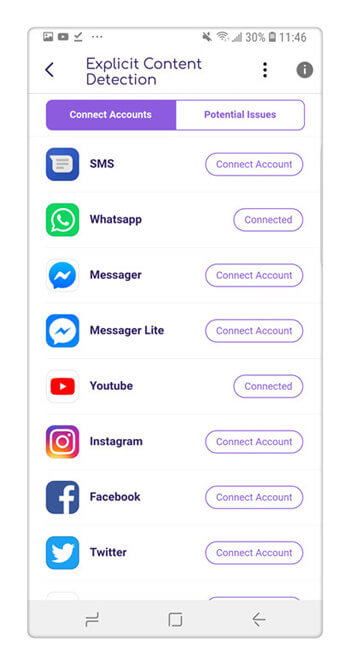Tips for Children About How to Stop Bullying in Schools
How to Stop Bullying in Schools
ALL TOPICS
- Anti Bullying
- Anti-Bullying Tips
- Parenting Tips
Sep 11, 2024 Filed to: Anti Bullying Proven solutions
How to stop bullying in schools is increasingly becoming one of the most asked questions among parents, teachers, and even children across the world, even after being highlighted in educational communities for years.
Despite a ton of work and awareness being spread around the US, bullying is still one of the biggest problems that children these days are facing, especially with the rise of internet connectivity, social media, and the fact that most children have access to their own smartphone, computer or tablet contributing to the growing problem of cyberbullying.
Whether you’re a parent worried that your child is being bullied or a child who’s a perpetrator of bullying, it can be a stressful and confusing time for everyone involved and needs to be dealt with properly, professionally, and in a productive way that cares for the well-being of everyone involved.
Today, we’re going to take a detailed look into the world of bullying, detailing everything you need to know on how to prevent, deal and alleviate any potential bullying problem.

Facts About Bullying Everyone Should Know
Before we start tackling the bullying problem, you must take the time to understand just how widespread the bullying problem is and the effects of bullying in school. The facts about bullying in schools are probably going to come as a surprise to you.
Here are some facts about bullying in schools, so you understand what the chances are that bullying will affect your child.
- 48% of all children in grades 4-12 will experience some degree of bullying in their lifetimes. 20% of these take place in grades 9-12.
- 70.6% of all children say they have seen some form of bullying occur in school, as have 70.4% of teachers. 41% of total witnesses say they have witnessed bullying at least once a week or more.
- Around 55.2% of LGBTQ students are cyberbullied during their education, as are 15% of all students.
- Only 20-30% of children will report their bullying experiences to an adult, teacher, or parent.
As you can see, the facts about bullying in schools are probably much higher than you first believed, and the chances that your child will be bullied during their time in education is around 50%, whereas the chances they’ve seen bullying surpasses 70% mark; so, what does this mean?
What Are the Effects of Bullying in School?
The second thing you need to be aware of is the consequences and effects of bullying in school has on children and the witness of it while it’s taking place in school. Without knowing this, it’s hard to be aware of the action's sincerity and what it can lead to.
- Disrupted Education
Perhaps the most widespread and common of all effects of bullying in school is a distraction. Every child is in school to learn to help them become educated and ready themselves for the future, but unfortunately, bullying is a form of distraction. Not only can the bullied and the bullied individual become severely distracted from their studies, as can anyone witnessing it. - Damaged Mental Health
There’s no denying the effects bullying in school can have on your child’s mental health and well-being, and these are problems that can last an entire lifetime. In some cases, bullying can become so bad it can even lead to suicidal thoughts and even death. Around 14% of teenagers have considered this, with 7% have attempted it. - Bullying Initiating Consequences
While it’s somewhat simple to imagine the consequences that being bullied can have on a child, few pay attention to how the individual bullying someone else might be affected in the long-term. Statistics in this area show that bullies easily find themselves in increasingly dangerous criminal activities.
What’s more, the risk of becoming involved in alcoholism and drug abuse increases dramatically and is one of the most common effects of bullying in school — the risk of abuse in relationships and finding themselves in fights as adults increases as well. - Witness Bullying Consequences
Even individuals who are not directly involved with bullying situations by being bystanders can face long-term effects from witnessing bullying. These include an increased risk of tobacco, alcohol, and drug use and a higher risk of skipping class and school.
As you can see, it doesn’t matter whether a student is involved in bullying, is bullying someone else, or even sees it taking place. There are effects that can lead into young adult and adult life, causing problems in later life.
Tips for Children About How to Stop Bullying in Schools
No matter where your children find themselves regarding bullying, it’s important to make sure they know how to deal with it and how to move forward. Having the ability to stand up and address what’s going on can be an incredible skill that will help throughout their lives.
Here are some tips to help your children prevent and how to stop bullying in schools;
- Be Respectful
Everybody should show everyone else respect because everyone has a right to at school safely and without being hassled. It doesn’t matter what anyone looks like, what their beliefs are, or what they’re doing. Teach your child to be respectful as much as possible. If they feel like being mean to somebody, they should have the ability to walk away. - Talk to Adult
If a child has the urges to bully someone or is being bullied by someone else, they need to be able to speak openly with an adult, whether that’s you or a teacher. They need to know they can have honest and confidential conversations with people they can trust. - Avoid Confrontation
Your child should be helped to be mindful of when they are being bullied and then advised how they can avoid these situations. Of course, this doesn’t mean your child should skip class or school, and bullying in classes shouldn’t take place with a teacher present. However, in hallways or school grounds, your child may want to take a longer route if it means missing a potential bully.
What Can Parents Do to Keep Their Children Away from Bullying?
While there’s a lot of information there that should be able to make a huge difference when it comes to preventing bullying at school, due to the rise of technology and social media, cyberbullying is also one of the biggest threats, but how can you protect against this and the effects of bullying in school?
As parents, we should also make use of modern technology and turn to technology for assistance. Nowadays, many developers have developed parental control apps that are equipped with different features to help parents solve the issues they face while raising their kids. These apps would make protect kids from cyberbullying or bullying in schools easier.
Among all the apps that are available on the markets. FamiSafe is the world’s leading parental control application that provides you the ability to check on your kid's activity on their digital devices. This includes the abilities to:
- Track the device’s location and set up geofences to receive custom alerts.
- Set up a screen time limit or schedule to help kids form good digital usage habit
- Monitor 7 mainstream social media to detect suspicious text or explicit content.
- Automatically filter websites that contain age-inappropriate content
- Block game or social media apps to prevent kids from getting addicted to them
- Alert parents when suspicious photos are detected on kid's album
A Reliable and Handy Parental Control App
- Location Tracking & Geo-fencing
- App Blocker & Web Filtering
- Web Filtering
- Screen Time Control
- Smart Parental Control Setting
Explicit Content Detection that Help Prevent Bullying
Messages and social media have become the new tools for bullying. That's why FamiSafe has come up with the Explicit Content Detection feature to help parents fight against bullying.
Since you won’t be able to monitor all the SMS messages at all hours of the day, FamiSafe does the hard work for you. Using scanning technology, the app will automatically read through your child’s SMS messages as they are being sent and received.
If the app then detects a word that could be used in a bullying sense, such as a swear word or a word that would be used to cause offense to someone, typically, you’ll receive a notification informing you about the messages.
This allows you to see exactly what’s going on at all times, as well as making sure you never miss a message that indicates your child is bullying or being bullied, ensuring you have all the information you need to make the right decisions regarding your child’s well-being.
This feature supports SMS, FacebookMessenger, Messenger Lite, Kik, WhatsApp, Gmail, and YouTube monitoring for Android devices. If your kid has an iOS device, you can still monitor their YouTube.

As you can see, bullying is still a much bigger problem than most parents realise. Still, there are plenty of approaches you can take to ensuring your child’s well-being is looked after the entire time, and the risk of bullying and consequent effects of it are minimised.

Thomas Jones
chief Editor